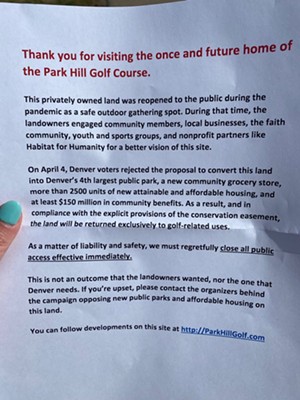Westside Investment Partners, the owner of the property, had been allowing public access to the defunct golf course as it campaigned to pass Referred Measure 2O, which would have lifted a conservation easement that is currently preventing the company from developing the golf course as housing.
But now it appears that after the April 4 municipal election — in which 2O lost by double digits — Westside quietly changed its policy on allowing public access.
The news came in the form of fliers handed out to people trying to use the overgrown golf course in recent weeks. According to Bill Rigler, a spokesperson for Westside, the investment group has hired private security to patrol the property and give the fliers to anyone on the property, informing them of the closure.
“On April 4, Denver voters rejected the proposal to convert this land into Denver’s 4th largest public park, a new community grocery store, more than 2500 units of new attainable and affordable housing, and at least $150 million in community benefits,” the fliers read. “As a matter of liability and safety, we must regretfully close all public access effective immediately.”
“I saw some stuff on Twitter saying people thought it might have been a hoax,” says Rigler. “I can confirm that [they’re] legitimate.”
Westside declined to comment on whether it plans to eventually put a fence around the property in order to better enforce the closure; photos have emerged online showing people still visiting and spending their leisure time there. Westside also declined to say whether it plans to prosecute any future trespassers.
The golf course closed in 2018, when the property was still owned by the Clayton Trust. The development group bought the 155 acres in 2019 for $24 million, and had allowed public use and access for recreational purposes. Until now.
As for the future of the land, Rigler points to a statement in the fliers: “In compliance with the explicit provisions of the conservation easement, the land will be returned exclusively to golf-related uses.” One of the allowable uses could even include construction of a Topgolf, says Rigler.

The flier security has been handing out to visitors of the Park Hill Golf Course.
@ellieroberts93 via Twitter
The fliers shoot down the possibility of the land becoming a park and slam the 2O opposition campaign.
“This is not an outcome that the landowners wanted, nor the one that Denver needs,” the fliers state. “If you’re upset, please contact the organizers behind the campaign opposing new public parks and affordable housing on this land.”
Passage of 2O would have lifted the city-owned conservation easement in place on the property that limits use of the land to an eighteen-hole golf course. That would have ultimately cleared the way for Westside to move forward with the development project it had been planning for years.
Voters who shot down 2O and the potential development, represented by the group Yes for Parks and Open Space, would like to see the land become a municipal park.
The city had tried to achieve that outcome back in the 1990s, but it could not afford the purchase price asked by the Clayton Trust. Instead, in 1997, the city paid to put a conservation easement on the property to block development and ensure that the land would remain a golf course.
After buying the property, Westside tried to convince Denver City Council to lift the easement, but was thwarted by the passage of Ordinance 301 in a 2021 municipal election. The ordinance mandates that a citywide vote must be held to decide if a conservation easement can be lifted. That citywide vote was held this year on measure 2O, which failed despite Westside putting over $920,000 into its campaign.
Denver’s mayoral runoff candidates — Mike Johnston and Kelly Brough, who both initially supported Westside’s development plan — said during a debate on April 12 that, if elected, they would purchase the land to create a park.
Even Darrell Watson, a runoff candidate for the District 9 council seat (which borders the Park Hill Golf Course) who attended campaign events with Westside and other supporters of 2O, tells Westword: “The voters clearly voted against development on PHGC, and I will stand with the voters on that decision. As a twenty-plus-year parks advocate, I would support all other options, including purchasing the 155 acres as a park.”
Watson’s District 9 rival, incumbent Councilmember Candi CdeBaca, has been a longtime opponent of the proposed development. Speaking about new pushes to buy the land for a park, she says, “Denver certainly has the money to do it, and I believe the leverage, and therefore we should do it!”
Jordan Fuja, a spokesperson for the Johnston campaign, says that the former educator will “work to deliver well-resourced open space and secure the best deal for Denver.”
Brough says she would buy the golf course using money from a $50 million Parks Legacy Fund to buy and maintain park land that was created by the 2018 passage of Ballot Measure 2A — Parks and Open Space Sales Tax, and would not consider paying more than what Westside bought it for in 2019.
Westside maintains that it is not open to selling the land.
While Brough does not say whether she would consider pursuing legal options to purchase the land if Westside refuses to sell, she adds, “I believe that by working together, we will find a solution.”
Stay connected with us on social media platform for instant update click here to join our Twitter, & Facebook
We are now on Telegram. Click here to join our channel (@TechiUpdate) and stay updated with the latest Technology headlines.
For all the latest For Top Stories News Click Here
